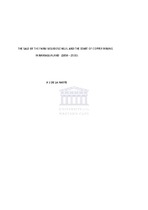The sale of the farm Melkboschkuil and the start of copper mining in Namaqualand (1850 – 2000)
Abstract
This thesis relates what is referred to in the text as a 'chronicle' of the history of the Cloete family of Springbokfontein and surrounding areas in Namaqualand, with particular attention to the issue of a land transaction in the early 1850s between seven Cloete brothers and the English copper mining company Phillips & King. The sale of the farm Melkboschkuil has since been a source of long-standing dispute on the part of the Cloete family. It traces the circumstances of the Cloetes' settlement in Namaqualand, the archival and oral record regarding the highly contentious ‘sale’ of the land between these parties, and the subsequent resonances of this land dispute over decades and indeed right up to the 1990s when the Cloete descendants lodged a land claim. The author attempts to use the very specific story of a land deal to throw light on the wider story of the relations between a disadvantaged Baster and later 'Coloured' family, and the white-dominated local and regional government in Namaqualand -- particularly in Springbok. At the same time, attention is drawn to the political and economic forces shaping the people around Springbokfontein during the late nineteenth and early twentieth centuries. The small story of the Cloetes is used to illuminate the wider history of the inequitable relations between white capitalists and Baster/Coloured landowners dispossessed of their historic rights to land. The thesis is based on a detailed examination of the struggle of the Cloete family in Namaqualand to secure possession of the land that they once owned but which became the site of a copper mine and later on the town of Springbok. The narrative told from the perspective of certain members of the Cloete family and their descendants, follows a convoluted trail of legal papers, land deeds and oral pronouncements. But at the heart of the story is the question as to how the Nama and Baster people of Namaqualand came to be divested of their rights to the land and a fair share of the mineral wealth of the district following the development of copper mining.

